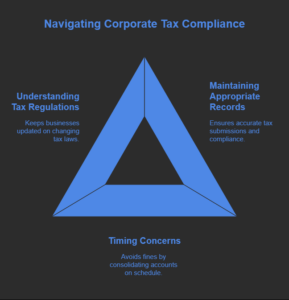Corporate taxes contribute significantly to a country’s economic growth by providing funds for infrastructure development efforts. Corporate taxes are a significant source of income to support such a large budget.
The UAE’s company tax policy shows its dedication to respecting international standards for transparency in the tax collection procedure. Therefore, companies doing business in the UAE must know how corporate tax laws affect them and what the possible consequences for noncompliance with tax laws and corporate tax fines are.
Corporate Taxes in UAE: An Overview
Corporate tax in the UAE was implemented to conform to worldwide tax trends. Businesses generating revenue of more than three lacs seventy-five thousand AED per year will be required to pay an additional nine percent corporation tax. The tax is applicable to numerous company formations and business structures.
Exemptions are available for foreign firms with a permanent base in the UAE. However, free zone enterprises must satisfy certain conditions. The tax regulations imposed fines for noncompliance to ensure compliance. These corporate tax fines apply to late submissions, faulty tax returns, and refusal to comply with tax officials.
Corporate Taxes Compliance Obligations

Maintaining Appropriate Records:
Small enterprises and start-ups may lack accounting.
Without accurate record-keeping, one cannot readily submit taxes.
Timing Concerns:
Some companies face numerous financial challenges. Consolidating the financial accounts on schedule will help you avoid fines for overdue accounts.
Understanding of Tax Regulations:
The UAE’s Federal Tax Authority is constantly amending the tax regulations. Businesses must be updated and organized to prevent last-minute rushes and penalties.
Fines and Penalties on Corporate Taxes in the UAE
The UAE imposed corporate tax, and companies prepared to cope with the consequences of this move. If one failed to comply with the corporate tax laws, a corporate tax fine would be imposed.
In the UAE, the following procedure is widely used to calculate the overdue penalty for business tax:
A predetermined penalty is imposed for the first month of late payment, usually as a percentage of the outstanding corporate tax amount.
Each extra month of delay bears a preset fine.
Interest is charged on late tax beginning with the due date and lasting until the complete amount is paid.
Corporate Tax Sanctions for Delayed Return Filing:
Corporate tax fines for delayed return filing may be quite significant. In the preceding example, when a company’s fiscal year ends and crosses the tax return filing deadline, failure to comply with federal decree regulations or submitting tax filings after the deadline may result in hefty Dirham penalties.
Failure to submit a corporation tax return on time might result in a fine of five hundred AED per month for the first year.
If the delay extends one year, the penalty rises to one thousand AED each month.
Corporate Tax Penalties for Delayed Registration:
Every firm must register for corporate tax and get a Registration Identification. Upon registration, the relevant Corporate Tax paperwork must be presented. However, failure to register or tardiness while registering for Corporate Tax would result in significant penalties.
Delayed Payments of Corporate Taxes:
Companies are expected to pay taxes on time. Failure to pay taxes may result in a fourteen percent annual interest rate assessed monthly or in part.
Unable To Keep Proper Financial Records:
Enterprises are required to keep books of account for at least five years. Failure to do so results in a hefty penalty of ten thousand AED for the first offense.
If it occurs again within the next two years, the monetary penalty doubles to twenty thousand AED.
Inappropriate Filing of Tax Returns:
Filing inaccurate tax returns, whether due to mistakes or miscalculations, incurs a five-hundred AED penalty unless addressed before the deadline.
Neglect To Report Tax Amendments:
Any changes to tax records must be submitted to the Federal Tax Authority. If a firm fails to do so, it will face:
Fines are one thousand AED per violation and five thousand AED for multiple violations within two years.
Refusing To Cooperate With Tax Auditors:
If a company fails to present needed documentation during an audit, it will face an administrative penalty of twenty thousand AED.
Tax Avoidance:
Businesses that attempt to escape taxes via fraudulent activity or false reporting face harsh corporate tax fines.
A legal proceeding was taken.
Potential suspension of corporate licenses.
Companies must pay their corporate taxes on schedule to avoid sanctions and penalties. Compliance with tax rules and timely payment of tax duties are critical for avoiding financial troubles and maintaining a good reputation with tax authorities.
Essential Steps to Avoid Corporate Tax Penalties and Fines in the UAE
Acquaint Yourself with the Latest Tax Legislation:
The Federal Decree-Law controls the corporate tax in the UAE. This statute outlines the specifics of the new Corporate Taxes, such as how they will be computed and which businesses will be subject to them. Firms should review and understand this legislation to guarantee compliance with the corporate tax fine check.
Determine Your Taxable Revenue:
To determine your taxable earnings, you must first estimate the company’s entire revenue. This comprises any funds created by your firm from sales, services supplied, goals, royalties, and other sources. Once you have calculated your overall income, remove any permissible deductions.
The most typical deductions are for company expenditures, including rent, staff pay, marketing charges, and other operational expenses. It is vital to know that some costs are not deductible, such as personal expenses or those unrelated to the running of your company.
Filing Corporate Tax Return:
Once you’ve determined your taxable revenue, you must submit a tax return to the UAE Tax Authority. Registration must be done yearly and may be done online. The deadline and more information on the filing processes have yet to be issued by the authorities.
Paying Corporate Taxes:
After you’ve submitted your tax return, you’ll need to pay Corporate Tax. It may be completed online, via mail, or in a bank.
Well-Versed Tax Accountant:
Corporate tax may be complicated and perplexing, so it’s critical to locate a tax accountant who understands these taxation guidelines. They can assist you with calculating your taxable income, filing your tax return, and paying corporate taxes.
The UAE’s corporate tax is included in a new tax legislation, and numerous issues still have to be worked out. Businesses must keep up with the latest changes. The simplest approach to accomplish this is to consider a tax accountant who is experienced and well-versed in UAE tax legislation.
Choose the Best Corporate Tax Advisors in the UAE
MBS Consultancy is a renowned accounting and audit business in the UAE, offering superior corporate tax services. Our objective is to provide the finest and most rapid business tax solutions to our customers. With our knowledge, we guarantee that companies not only comply with corporate tax rules but also keep up to date on any changes in the corporate tax environment.
Final Words
Companies that failed to comply with UAE corporate tax legislation faced sanctions and corporate tax fines. Businesses must consider registering for Corporate Tax on time and make the appropriate payments as soon as feasible to prevent consequences.
Businesses may consider a professional tax consultant or accountant for proper record keeping, tax filing, and submissions to prevent delays and avoid legal sanctions and penalties.
FAQs
What Is the Penalty for Corporate Tax in The UAE?
In the UAE, corporate tax penalties include 500 AED–1,000 AED monthly for late filing, 14% annual interest on late payments, 10,000 AED to 20,000 AED for poor record-keeping, and 20,000 AED for refusing audits. Repeated violations or tax evasion may lead to license suspension and legal action.
Is It Mandatory to File Corporate Tax in The UAE?
Those businesses earning over AED 375,000 annually are required to register, file, and pay corporate tax. There are exemptions for certain free zone entities and government-owned companies. However, most active businesses must comply.
What Is the 9% Corporate Tax in The UAE?
The corporate tax in the UAE is a flat 9% tax on profits exceeding AED 375,000 per year. Earnings below that threshold are exempt. This ensures that startups and smaller businesses are not burdened while aligning the UAE with global tax standards.
Who Is Exempted from Corporate Tax in The UAE?
The corporate tax exemptions apply to government entities. Some free zone companies meeting specific criteria are also included. Foreign firms without a UAE permanent base, and select non-commercial organizations, are also exempted. Businesses must confirm eligibility before skipping tax filing.
What Is the Deadline for Corporate Tax Registration in The UAE?
It is required that every business register with the FTA and obtain a Tax Registration Number. Exact deadlines vary by fiscal year. Late registration attracts heavy penalties. Therefore, companies should register promptly to avoid fines.
What Is the Maximum Penalty for Tax Evasion in The UAE?
In the UAE, tax evasion brings the harshest consequences in the form of heavy fines, possible suspension of trade licenses, legal prosecution, and reputational damage. Deliberate fraud or false reporting can escalate into criminal proceedings.




